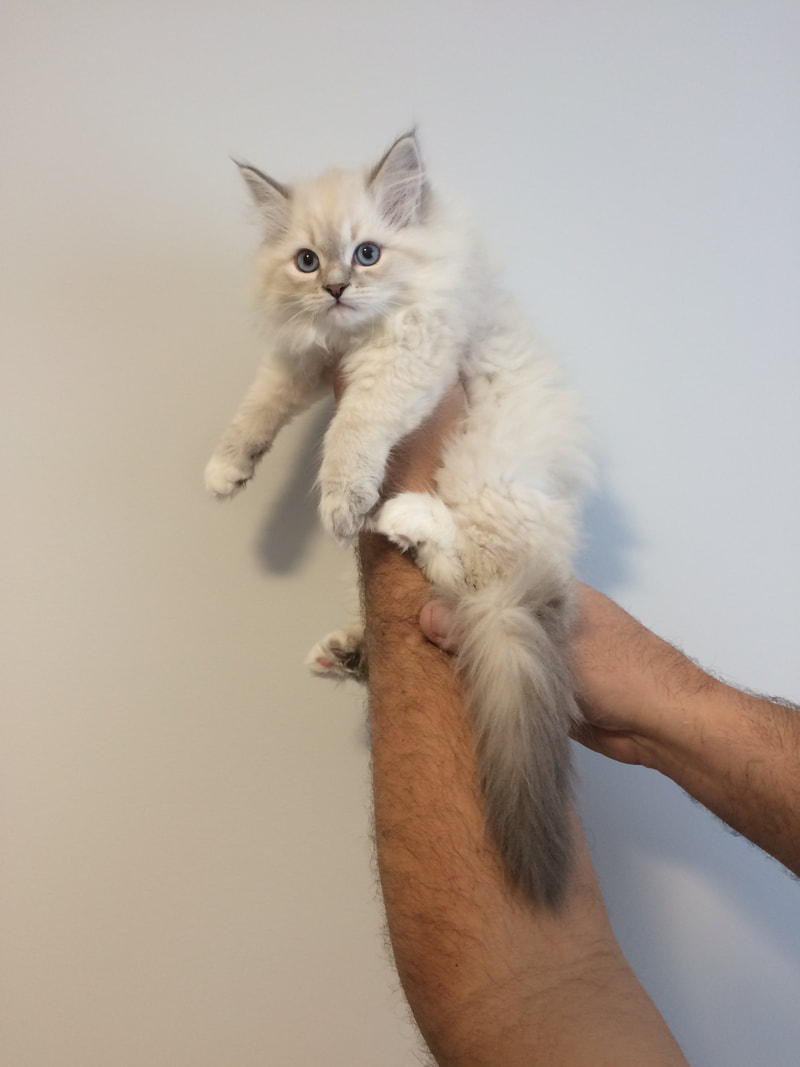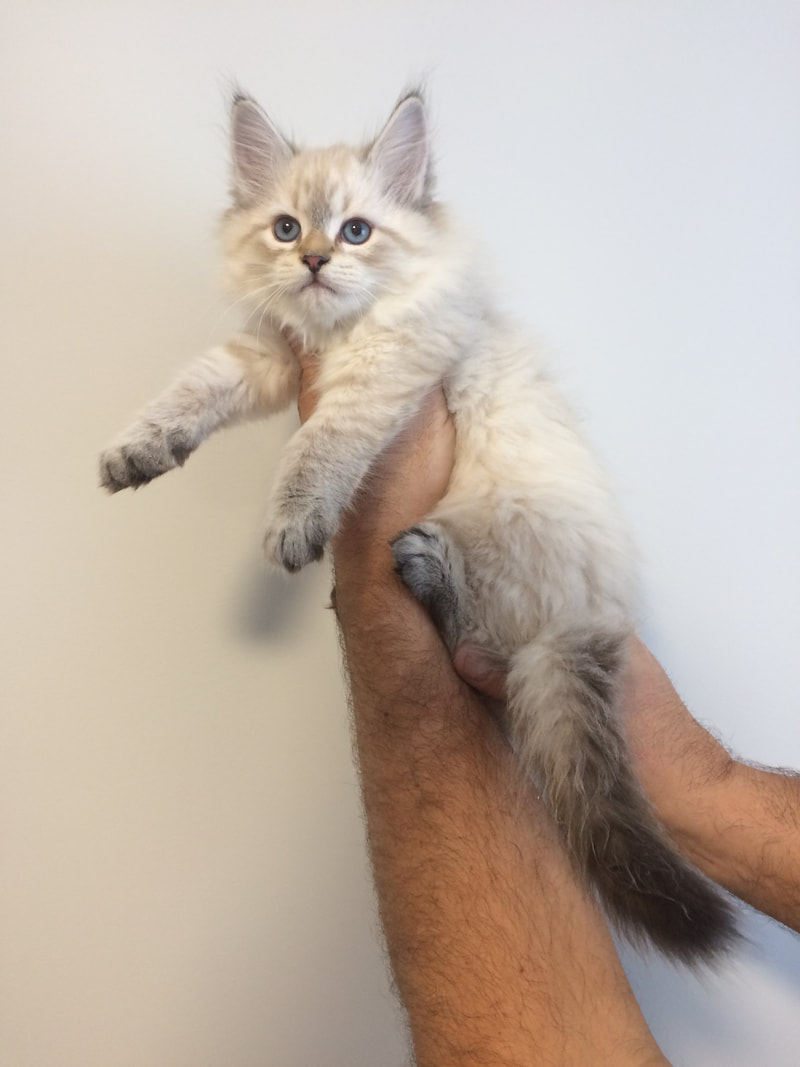AVAILABLE SIBERIAN KITTENS
Most cat allergies are from Fel d1, a very small allergen produced in saliva and fur. ELISA technology makes it possible to measure the allergen a kitten will produce when mature. Our kittens are placed in homes with mild to severe cat allergies with excellent success. Our tests use a special salivant and a proprietary method for obtaining saliva from cats/kittens. We stimulate allergen release in kitten saliva which allows us to measure future allergen production. Kittens can be tested starting no earlier than 12 weeks of age.
The Allergen Chart © below shows what allergen level in a cat that is needed for a corresponding group of symptoms. Match the symptoms you would expect from direct exposure to a cat (face to fur).
Allergen levels below are shown in micrograms per milliliter of saliva - µg/ml. Chart used with permission from KittenTesting.com.
Cat/Kitten Saliva Level Corresponding allergic symptoms ©.
Extra Low. 0.1 - 1.0 mcg hives, swelling, severe sneezing, airway constriction
Very Low 1.0 - 1.75 mcg itchy skin, light sneezing, severe runny nose, mild asthma
Low 1.75 - 2.5 mcg moderate symptoms, runny nose, eye irritation, coughing
Medium 2.5 - 3.5 mcg mild cat allergies - eye irritation and stuffy nose
Normal 3.5 - 16 mcg not recommended for homes with cat allergies
© 2005 "Allergen Chart" Meredith Lundberg, DBA Lundberg Siberians, DBA Kitten Testing.com
The allergen chart, allergen levels, and allergic reactions by severity are copyrighted by Meredith Lundberg, DBA KittenTesting.com. Commercial use or derivative use without permission is prohibited. Individuals with allergies should seek proper medical advice before purchasing a cat or kitten.
Allergen levels below are shown in micrograms per milliliter of saliva - µg/ml. Chart used with permission from KittenTesting.com.
Cat/Kitten Saliva Level Corresponding allergic symptoms ©.
Extra Low. 0.1 - 1.0 mcg hives, swelling, severe sneezing, airway constriction
Very Low 1.0 - 1.75 mcg itchy skin, light sneezing, severe runny nose, mild asthma
Low 1.75 - 2.5 mcg moderate symptoms, runny nose, eye irritation, coughing
Medium 2.5 - 3.5 mcg mild cat allergies - eye irritation and stuffy nose
Normal 3.5 - 16 mcg not recommended for homes with cat allergies
© 2005 "Allergen Chart" Meredith Lundberg, DBA Lundberg Siberians, DBA Kitten Testing.com
The allergen chart, allergen levels, and allergic reactions by severity are copyrighted by Meredith Lundberg, DBA KittenTesting.com. Commercial use or derivative use without permission is prohibited. Individuals with allergies should seek proper medical advice before purchasing a cat or kitten.
IF YOU ARE REACTING TO YOUR CAT or if you have chronic allergies:
The following suggestions can help reduce buildup of Fel d1 and other cat allergens in the home.
Routine bathing removes a large amount of allergens present in the fur. Your cat will still produce the same amount of Fel d1 allergen, but the amount in the home will be lower. Weekly bathing your cat reduces household airborne feline allergen levels by 45%.
Moistening your pet prior to combing reduces allergens released into the air during grooming. Allerpet Grooming Solution works well to moisten the hair, removes oils and deactivates allergens. It also prevents the fine undercoat from floating into the air during grooming.
Place washable throws on any area your cats like to sleep. Include couches and chairs as well as climbing stations and cat beds. Wash all throws weekly in hot water, detergent and borax to remove and deactivate allergens.
Frequent vacuuming rugs and soft surfaces reduces allergen levels. Air out the house after vacuuming, and damp mop hard floors and wipe hard surfaces. When possible, replace carpets in bedrooms with washable hard flooring.
Clean and change litter boxes frequently to reduce Fel-d1 and other allergens. Keep the litter box out of your living area, and never put it near air vents (or air returns). The highest concentrations of many allergens are found in the litterbox. Place the litter box in the garage or a room that can be vented to the outside. Young kittens get dust on their coats from powdery litters, which tracks irritants and allergens into the house. Try different types of litter, as many types have irritants or perfumes which will cause allergic reactions. NON SCENTED LITTER IS BEST.
People with mild cat allergies may be able to allow their cat in the bedroom. Individuals with severe or dangerous allergies should have an allergen-free room for sleeping. If allergies persist, always keep your cat out of the bedroom.
High efficiency particulate absorbing (HEPA) filters are high-efficiency air filters, and are good at removing very small particles like Fel d1. Running a HEPA filter and keeping your cats out of the bedroom reduces airborne allergens in the bedroom by half.
Site powered by Weebly. Managed by JustHost


